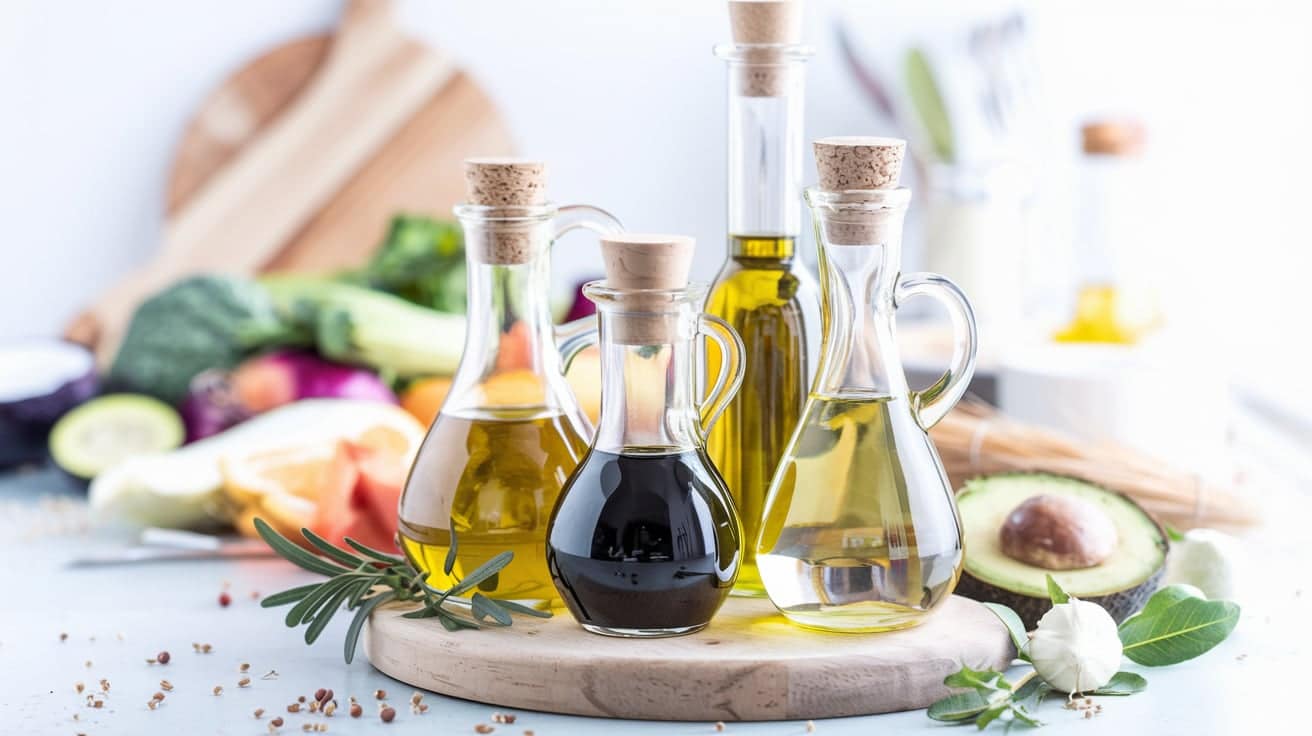Have you ever wondered if seed oils are as healthy as they’re claimed to be? It’s true, and today I’ll help you understand the potential risks that come with consuming these oils, especially those high in omega-6 fatty acids.
You’ll also find out how bad seed oils can affect your health, leading to issues like heart disease and diabetes.
Don’t worry, I’ll also share some better alternatives to bad seed oils that are easy to incorporate into your meals.
By the end of this guide, you’ll know exactly how to make healthier choices for both your body and the planet. Are you ready to take charge of your cooking? Let’s dig in.
Understanding Seed Oils
Seed oils are extracted from the seeds of various plants and are commonly used in cooking and processed foods. These oils include popular options like canola, soybean, sunflower, safflower, corn, cottonseed, grapeseed, and rice bran oils.
Nutritionally, they are high in omega-6 fatty acids, which are essential but can be harmful in excess.
List of Seed Oils to Avoid
While not all seed oils are equally harmful, some are more processed and contain higher levels of omega-6 fatty acids. Here’s a seed oils list of what you should avoid if you’re looking to support better health:
- Canola oil
- Soybean oil
- Corn oil
- Cottonseed oil
- Sunflower oil
- Safflower oil
- Grapeseed oil
- Rice bran oil
These oils are often found in packaged snacks, frozen foods, condiments, and even “healthy” cooking sprays. Minimizing your intake of these seed oils can reduce inflammation and support overall wellness.
Why Bad Seed Oils Can Harm Your Health
Bad seed oils, rich in omega-6 fatty acids and processed with harmful methods, can cause inflammation, oxidative damage, and long-term health issues like heart disease and diabetes.
1. How Omega-6-Rich Seed Oils Affect Your Body
Eating too many omega-6 fats, common in seed oils, can upset your body’s balance. This imbalance may lead to chronic inflammation, which is connected to heart disease, diabetes, arthritis, and more.
Balancing your intake by cutting back on seed oils and adding omega-3-rich foods, like fish or flaxseed, can help lower inflammation and support long-term health.
2. Oxidation and Cooking Risks
Overheating seed oils during cooking can lead to oxidation, producing harmful compounds like free radicals.
These compounds contribute to oxidative stress, damaging cells and increasing the risk of chronic diseases like heart disease and cancer.
It’s crucial to use seed oils at the proper temperature and avoid reheating them to prevent the formation of these harmful byproducts.
3. Processing and Refining
Seed oils are often processed at high heat, which can strip away beneficial nutrients and create unhealthy byproducts.
Processes like bleaching and deodorizing further degrade the oils, making them less healthy. These oils may also contain trans fats, which are known to contribute to heart disease.
Opting for minimally processed oils can reduce exposure to these harmful substances.
4. Genetically Modified Crops
Many seed oils are derived from genetically modified (GM) crops, raising concerns about their potential health risks.
GM crops may have higher pesticide residues and could affect gut health. Additionally, the environmental impact of growing GM crops, such as soil depletion and biodiversity loss, adds another layer of concern.
Choosing organic, non-GMO oils is a way to reduce exposure to these potential risks.
5. How Seed Oils Affect You Day to Day
Beyond long-term risks, eating too many seed oils can leave you feeling sluggish, bloated, or inflamed. If you deal with joint pain, brain fog, or stubborn weight gain, excess omega-6 fats could be part of the problem.
These everyday symptoms are often overlooked but can improve when you switch to healthier oils and balance your fat intake.
Seed Oil Alternatives: Better Oil Choices
Replace bad seed oils with healthier alternatives that offer better nutritional profiles, stability, and versatile cooking uses
Olive Oil
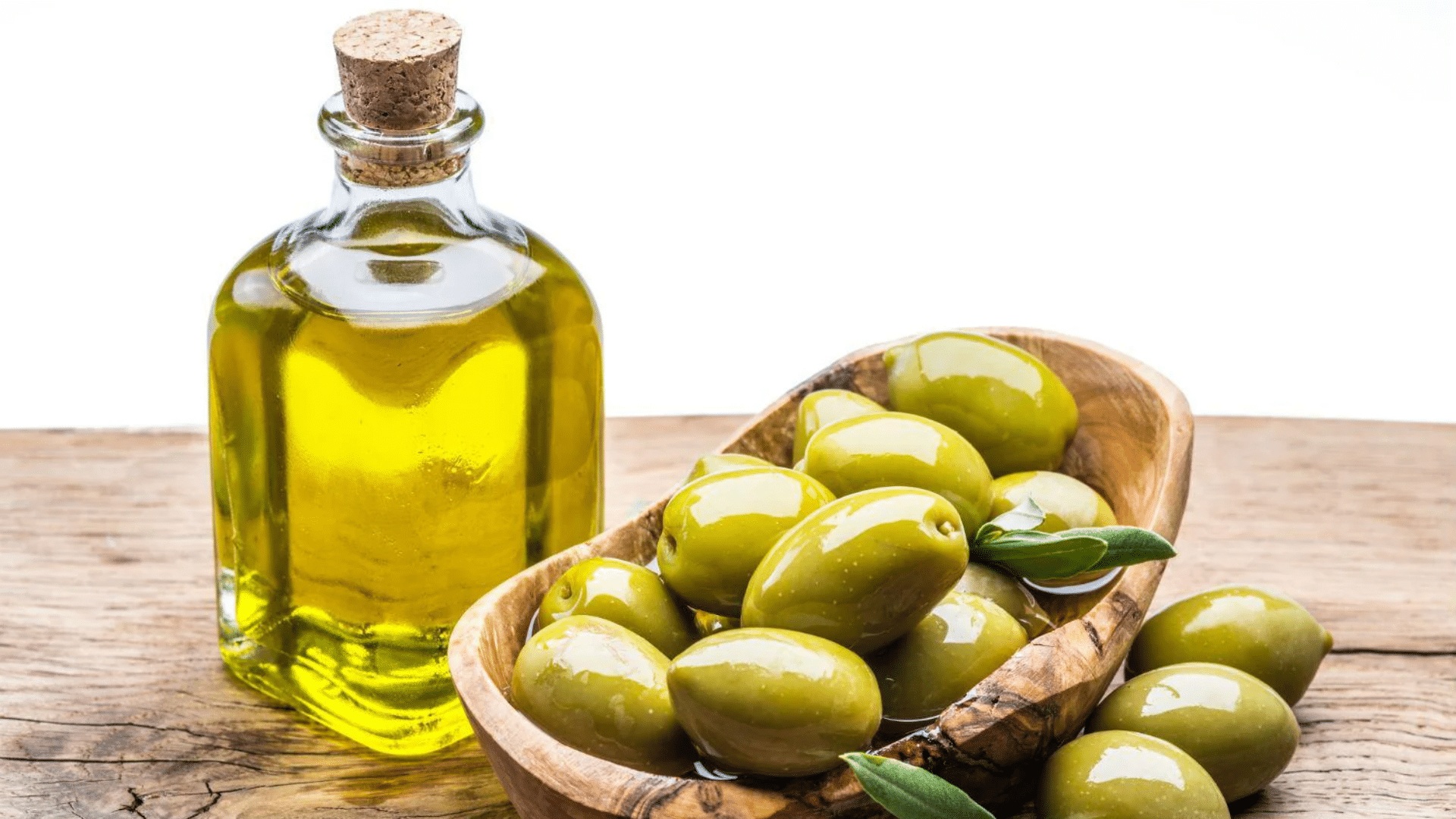
Olive oil is a heart-healthy option rich in monounsaturated fats and antioxidants. It’s ideal for drizzling over salads, making dressings, or sauteing at low to medium heat.
The Mediterranean diet, known for promoting longevity, includes olive oil as a primary fat source. It’s versatile, improves flavor, and offers anti-inflammatory benefits, making it a staple in a healthy diet.
Avocado Oil
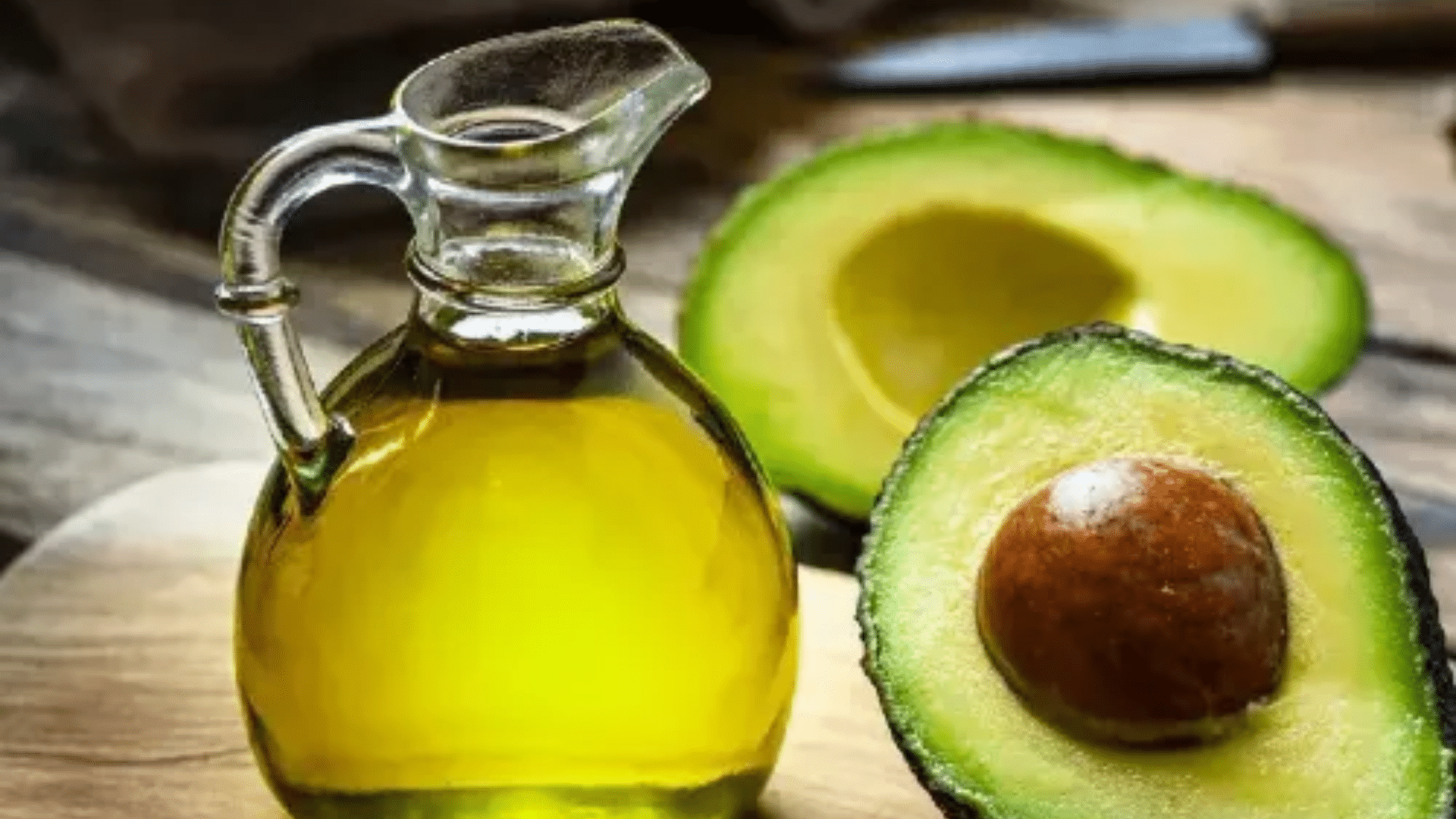
Avocado oil has a high smoke point, making it perfect for frying, grilling, and searing. Rich in monounsaturated fats, it supports heart health and provides a neutral taste that blends well with most dishes.
In addition to its high heat tolerance, avocado oil is packed with vitamin E, an antioxidant that supports skin and immune health, making it a great all-around oil.
Coconut Oil
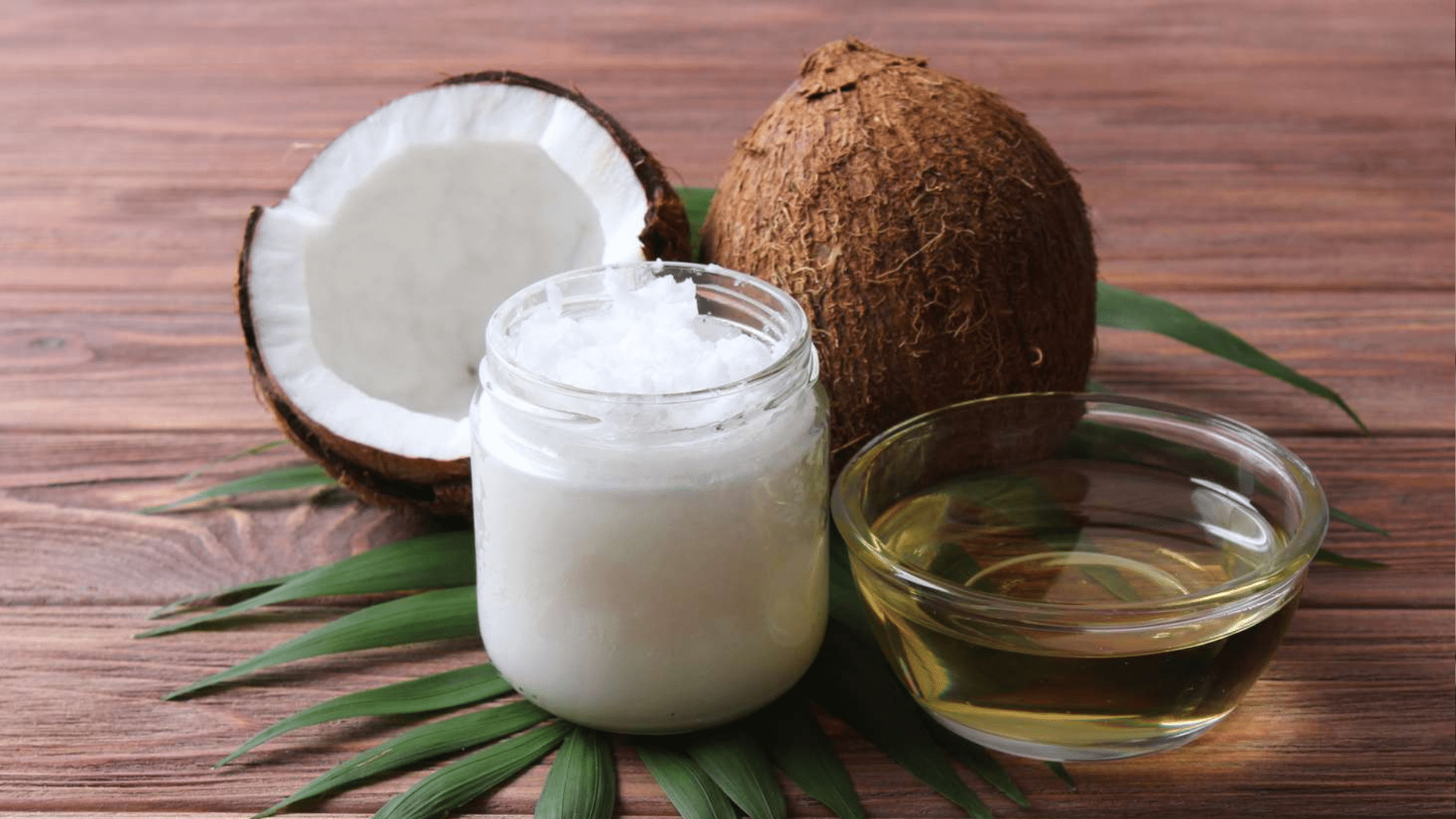
Coconut oil is a versatile oil with a high saturated fat content, ideal for medium-heat cooking, frying, and baking. Its medium-chain triglycerides (MCTs) may support metabolism and energy.
Coconut oil imparts a mild, pleasant flavor to baked goods and curries, making it a go-to for various recipes. Though high in saturated fat, its health benefits outweigh concerns when used in moderation.
MCT Oil, Hemp Oil, Walnut Oil
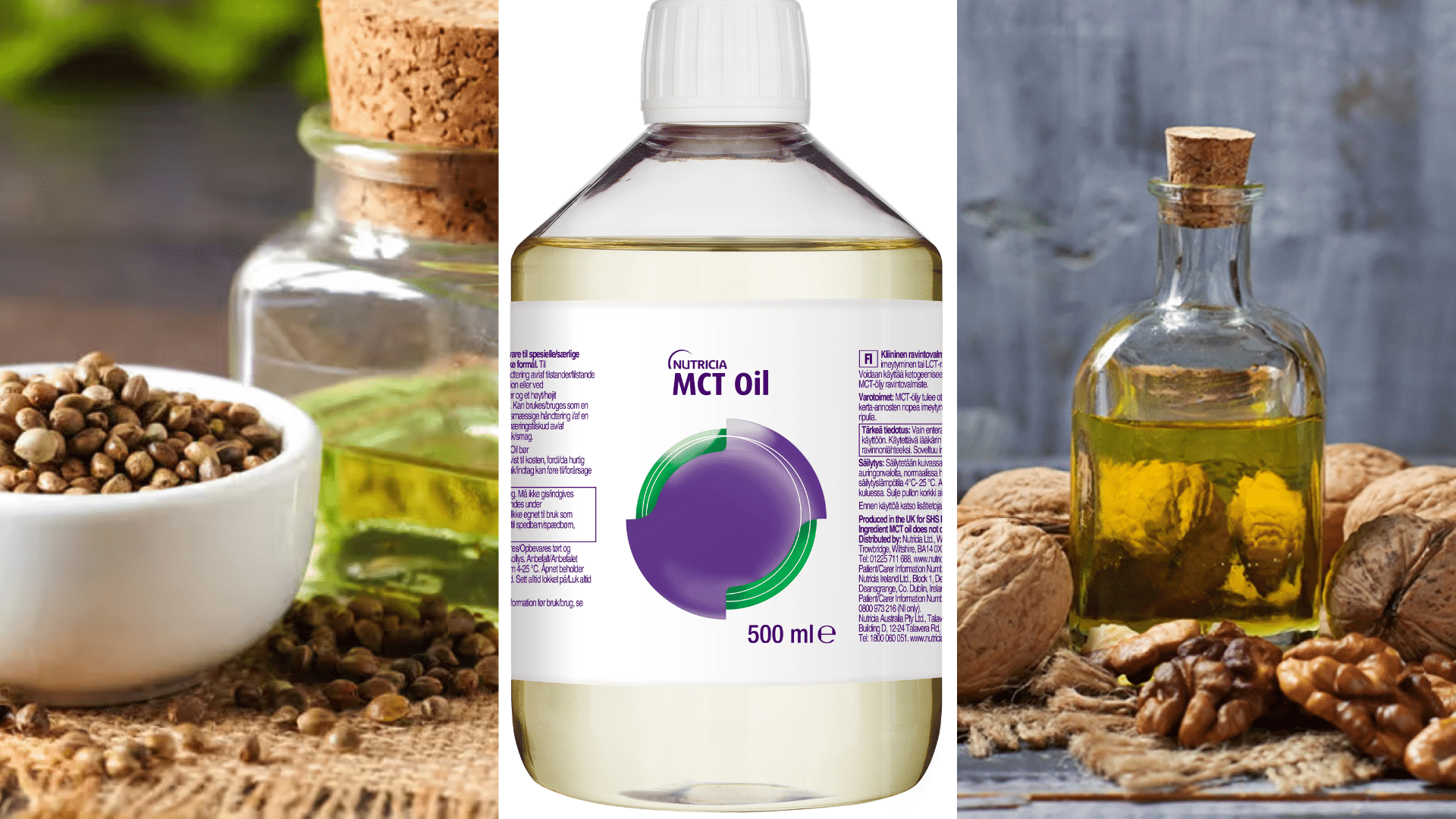
Other healthy oils like MCT oil, hemp oil, and walnut oil each have unique properties. MCT oil is ideal for adding to smoothies or coffee due to its quick energy release.
Hemp oil is great for dressing and drizzling on salads due to its omega-3 fatty acids, while walnut oil offers a rich, nutty flavor perfect for salad dressings and low-heat cooking.
Each oil serves its purpose, providing nutritional benefits depending on your cooking needs.
Nutritional Comparisons of Different Types of Oil
When choosing between seed oil alternatives, consider their omega-3 to omega-6 ratios, smoking points, and flavor profiles to make healthier choices for cooking.
Oil Type | Omega-3 Friendly | Smoking Point | Taste Profile | Best Use |
Olive Oil | High in Omega-3 | 375-410°F (190-210°C) | Light, fruity, slightly peppery | Dressings, sautéing, and Mediterranean dishes |
Avocado Oil | Moderate in Omega-3 | 520°F (271°C) | Mild, buttery flavor | Frying, high-heat cooking, roasting |
Coconut Oil | Low in Omega-3 | 350°F (177°C) | Slightly sweet, tropical flavor | Baking, medium-heat cooking |
MCT Oil | High in Omega-3 | 320°F (160°C) | Neutral flavor | Smoothies, coffee, and low-heat cooking |
Hemp Oil | High in Omega-3 | 330°F (165°C) | Earthy, nutty flavor | Dressings, drizzled over salads |
Walnut Oil | High in Omega-3 | 320°F (160°C) | Rich, nutty flavor | Salad dressings, low-heat cooking |
Canola Oil (Seed Oil) | Low in Omega-3, High in Omega-6 | 400°F (204°C) | Mild, neutral flavor | Baking, frying |
Soybean Oil (Seed Oil) | Low in Omega-3, High in Omega-6 | 450°F (232°C) | Neutral flavor | Frying, processed foods |
By choosing oils with balanced omega-3 to omega-6 ratios and higher smoke points, you can optimize both your health and cooking outcomes.
Seed Oils in Specific Diets and Demographics
Seed oils can affect various groups differently, including athletes, individuals with chronic conditions, pregnant women, and children.
Understanding how these oils impact health is crucial for making informed dietary choices.
Athletes
Athletes, especially those with high physical activity, may be more susceptible to inflammation and joint issues caused by the high omega-6 content in seed oils.
Consuming excessive omega-6 fatty acids can lead to an imbalance in the body’s fatty acids, potentially aggravating joint pain and hindering recovery.
Opting for oils with a better omega-3 to omega-6 ratio, such as avocado or olive oil, can help reduce inflammation and improve joint health.
Chronic Conditions
For individuals with heart disease, autoimmune disorders, or metabolic issues, consuming seed oils high in omega-6 fatty acids may worsen inflammation and contribute to disease progression.
Omega-6 fatty acids can promote the production of pro-inflammatory compounds, which are detrimental in managing these conditions.
Replacing seed oils with anti-inflammatory alternatives like olive oil or coconut oil can help reduce the risk of complications and improve overall health.
Pregnant Women and Children
Pregnant women and children should be mindful of their omega-6 intake, as excessive consumption of seed oils can affect the developing brain and immune system.
High omega-6 levels may interfere with the balance of essential fatty acids needed for brain development.
Pregnant women should prioritize oils rich in omega-3s, such as flaxseed oil or olive oil, while ensuring that children have balanced fat intake for healthy growth and development.
The Environmental Impact of Seed Oils
Seed oil production has significant environmental effects, including water usage, soil depletion, pesticide use, and sustainability concerns.
Water Usage and Soil Depletion
Growing crops for seed oils, such as soy, canola, and sunflower, requires vast amounts of water and contributes to soil depletion.
These crops often rely on irrigation, which strains local water resources, and repeated planting of the same crops depletes soil nutrients.
The environmental toll of large-scale farming may lead to long-term soil fertility issues, making it important to consider the environmental cost of these oils in our diets.
Pesticide and Fertilizer Use
Genetically modified crops, commonly used for seed oils, are often treated with heavy pesticide applications.
This practice poses risks to the environment, including soil degradation, water contamination, and harm to beneficial insects.
The widespread use of fertilizers also contributes to nutrient runoff, which can lead to harmful algal blooms in waterways. Choosing non-GMO, organic alternatives can help mitigate these environmental concerns.
Sustainable Alternatives
Oils like olive oil and avocado oil are more sustainable options, often requiring less water and pesticide use in their cultivation. These oils are typically produced in regions with better agricultural practices and lower environmental impact.
By choosing these alternatives, you support more eco-friendly farming practices and reduce the environmental footprint of your diet. Opting for sustainable oils benefits both personal health and the planet.
The environmental impact of seed oils affects both the planet and your health. Non-organic seed oils often contain pesticide residues that can accumulate in the body, leading to hormonal imbalances and immune dysfunction.
Choosing sustainable oils, like olive and avocado oil, reduces exposure to these harmful chemicals, benefiting both the environment and your health.
Practical Tips for Reducing Seed Oil Intake
To reduce your intake of seed oils, consider adopting simple habits like reading labels, cooking at home, making meal swaps, and using healthier cooking methods.
- Read Labels: Check ingredient lists for seed oils in packaged foods. Seed oils like canola, soybean, and sunflower are common in processed snacks and ready-to-eat meals.
- Cook at Home: By preparing your meals at home, you can control the oils you use. Opt for healthier fats like olive, avocado, or coconut oil for better health.
- Meal Swaps: Replace seed oils in everyday recipes with alternatives like olive oil for dressings or avocado oil for high-heat cooking. These swaps can improve your diet without sacrificing taste.
- Healthy Cooking Methods: Use oils at their ideal temperature to prevent oxidation. Avoid reheating oils multiple times, as this can lead to the formation of harmful compounds.
These easy changes can lead to improved health and better control over the oils you consume.
Conclusion
Now that you understand the health risks of bad seed oils, you can make more informed choices for your diet.
Making small swaps, like choosing olive or avocado oil instead of seed oils, can lower inflammation and support better health. It’s a simple step that adds up over time.
So, the next time you’re cooking, keep this list of seed oils to avoid in mind, and try swapping them out for healthier oils like olive or avocado. It’s a simple shift that supports your long-term well-being.
Want more tips on living a healthier life? Check out my other blogs for more helpful advice and delicious options to keep your meals nutritious and tasty.




